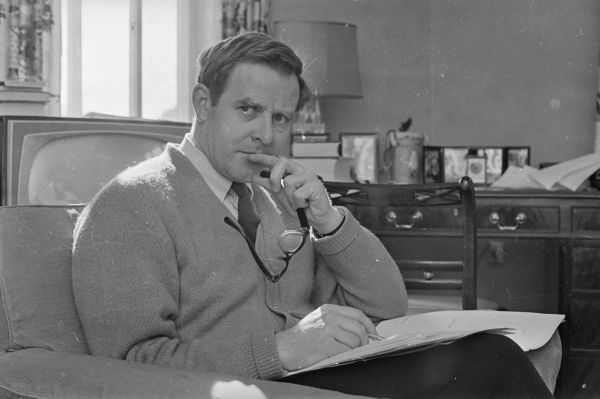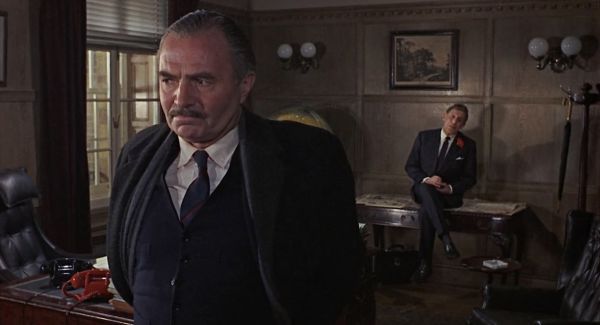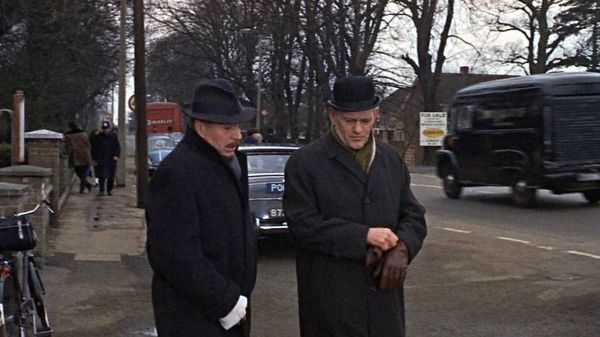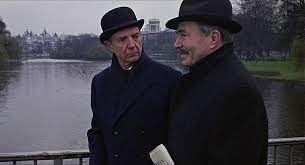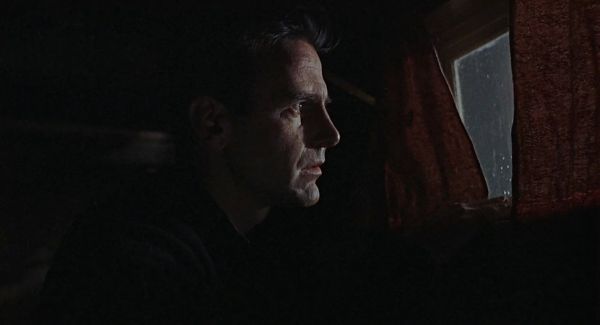John leCarré: Call for the Dead quotes
John leCarré: Call for the Dead quotes
I started reading everything by John leCarré after watching the 1979 mini-series of Tinker, Tailor, Soldier, Spy. His level of success varied, like any writer, but he turned out some of the best stuff I have ever read; and he did not just write outstandingly; he was also very quotable.
But don't google "John leCarré quotes." I tried that. The "quote" web-sites include just anything the man ever said. Most of it does not warrant remembering. Enjoy the books, because you might find yourself marking entire passages, and you may run out of bookmarks. Here are a few quotes from his first novel Call for the Dead, published 1961. The clever plausibility of Call for the Dead made it a pleasure to read. The images below come from the movie The Deadly Affair, directed by Sidney Lumet in 1967, that starred James Mason, Simone Signoret, and Maximilian Schell.
A counterespionage officer named George Smiley interviewed an official from the Foreign Office, Samuel Fennan, about his membership in the Communist Party, which he had neglected to mention when he started working in the Foreign Office. After the interview, Fennan committed suicide, and Smiley had to face the consequences with his superior, a man named Maston. Rather than deal with Maston, Smiley resigned from the service.
In an interesting passage, he explains why:
Chapter V:
(I)n his recent interviews with Maston, the power of detachment had left Smiley; he
was getting too involved. When Maston made the first moves, Smiley had been too
tired and disgusted to compete. . . .
The problem no longer existed; suspicion, experience, perception, common sense—
for Maston, they were not the organs of fact. Paper was fact; ministers were fact;
Home Secretaries were fact. The Department did not concern itself with the vague
impressions of a single officer when they conflicted with policy.
George Smiley feels responsible for Fennan's death, and a hostile interview with Fennan's widow does not help matters, but he has to keep investigating because of the discrepancies in the case.
Smiley and Police Inspector Mendel delve into the minutiae of Fennan's life. For instance, why did Fennan request a wake-up call for 8:30 am, if he intended to commit suicide the night before? At first, his wife claims that she asked for the call, but Mendel contacted the operator who made the wake-up call and reports:
"The girl remembers the call clearly. It came right at the end of her shift—five to eight
last night. It was made by Fennan himself. The girl is positive of that."
Smiley added, "I'd forgotten it couldn't possibly be Mrs. Fennan who'd asked for it."
"Why not?"
"She's an insomniac—she told me. . . . So why should she want a call at 8:30?"
"Why should her husband?" Mendel retorted. "Why should anyone? It's damn nearly
lunch time. God help the Civil Service."
Like any good novelist-detective, leCarré cares about his characters' motives and how they mesh with organizational politics. Smiley lets Fennan tell his own story:
Chapter VIII:
It had been natural enough that Fennan should join the Left at Oxford. It was the
great honeymoon period of University communism; and its causes, heaven knows,
lay close enough to his heart. . . . It was inevitable that Fennan should seek an
outlet for his anger. Besides, the Party was respectable then—the failure of the
Labour Party had convinced many intellectuals that the Communists alone could
provide an alternative to capitalism and fascism.
But the lives of Fennan's collegiate-communist friends disappointed him, he told Smiley:
They were not men but children who dreamed of freedom-fires, gipsy music, and
one world tomorrow, who rode on white horses across the Bay of Biscay. . . .
About Marxism itself, Fennan told Smiley that:
He feasted on its intellectual ruthlessness, was thrilled by its fearlessness, its
academic reversal of traditional values. In the end, it was this and not the Party
that gave him strength . . . a philosophy that exacted total sacrifice in an unassailable
formula.
Finally, Fennan told Smiley that "he turned his back sadly upon it, as a treasure he had outgrown."
Chapter XVI:
As Smiley continues investigating the death of Fennan and Fennan's connection to the Communist Party, he learns more about the Soviet agent Dieter Frey, who was in touch with Fennan, and finds himself loathing Dieter and Marxism's simplistic appeal to the "Masses":
Everything Smiley admired or loved had been the product of intense individualism.
That was why he hated Dieter now, hated what he stood for more strongly than
ever: it was the fabulous impertinence of renouncing the individual in favour of
the mass. When had mass philosophies ever brought benefit or wisdom? Dieter
cared nothing for human life, only dreamed of armies of faceless men bound by
their lowest common denominators. He wanted to shape the world as if it were
a tree, cutting off what did not fit the regular image.
I googled "ten best John leCarré novels." Call for the Dead was not on any of them; but it ranks high on my list for its inventive, intelligent story, London locations, and expert characterizations. Only a few of his works are better than this.

